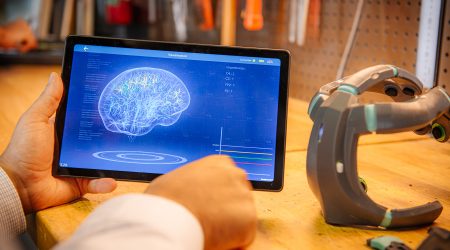The world’s biggest clinical trial using EEG neurofeedback as a therapy to manage chronic pain has been launched in New Zealand.
Chronic pain (defined as pain that persists for longer than three months) affects up to one in five people around the world and is a massive burden on healthcare systems and economies. A 2018 report commissioned by the Australian and New Zealand College of Anaesthetists (ANZCA) estimated the total annual cost to New Zealand of chronic pain at $13-14.9 billion – greater than those for diabetes, dementia and smoking.*
EEG Neurofeedback is a non-invasive therapy that works by monitoring brain activity and using that data to help the patient ‘retrain’ how their brain responds to nerve signals from the body.
The trial is funded by New Zealand-based health tech company Exsurgo and is being led by researchers from Auckland University of Technology (AUT) and WaitematÄ District Health Board (WaitematÄ DHB) and is happening despite New Zealand’s Covid Alert levels,
In the trial, 116 participants who suffer from chronic pain will wear a custom designed Axon EEG headset developed by Exsurgo. The headset passively reads the bio-electrical activity associated with pain in the participant’s brain and sends this data wirelessly to a mobile device in real-time. As they wear the headset, participants undertake exercises (in the form of simple animated games played on a tablet or smartphone). These exercises reward and reinforce positive change in the brain’s electrical activity.
By using the Axon system on a regular basis (about 30 minutes per day over the course of several weeks), the patient learns to ‘retrain’ how their brain perceives and responds to pain. This process is called “neuromodulationâ€.Â
Dr David Rice, Associate Head of Research & Senior Lecturer School of Clinical Sciences at AUT and primary investigator, says that chronic pain is common, complex and hard to treat.
“It is estimated that one in five New Zealanders suffer from chronic pain^ which can severely impact physical and psychological wellbeing. Increasingly we are finding evidence that chronic pain is driven by changes to pain pathways in the brain and so this trial is seeking to find whether the Axon headset can target these changes to effectively treat chronic pain.â€
The New Zealand trial follows an initial Proof of Concept clinical trial in the United Kingdom, conducted during 2020. In the UK study, three-quarters of patients reported a reduction in pain of at least 30% (considered to be a clinically significant improvement). Patients also reported significant reductions in anxiety and depression, as well as improvements in sleep patterns and overall quality of life.Â
Exsurgo Chief Science Officer, Christine Ozolins is a lead investigator on the clinical trial and says EEG Neurofeedback has potential advantages over traditional drug-based therapies which can carry risks of side effects and addiction concerns.
“Chronic pain and the associated problems that drug-based therapies bring to this condition, are one of the biggest healthcare issues facing the world today. The very promising results from our Proof of Concept UK trial has given us the confidence to move forward with this much larger trial in New Zealand. It is our hope that the trial will demonstrate the Axon headset as another tool in the toolbox for treating chronic pain.â€
Conventional EEG Neurofeedback is complicated and costly for both patient and doctor requiring attendance at a specialist clinic and for a clinician to be present to interpret the brain activity data, using systems that cost in the tens to hundreds of thousands of dollars.
While existing EEG science underpins Axon, Exsurgo is leveraging miniaturised technology, advanced data analytics and artificial intelligence to transform EEG Neurofeedback into a cost-effective, mobile system that can be used in a professional clinical setting or at a patient’s home.
People who have had moderate to severe pain for at least three months and meet other specified trial criteria will be eligible to participate in the trial. Participants in the New Zealand trial will receive a training session in person or online and will complete the remainder of the treatment in the comfort of their own home for the duration of the trial.Â
